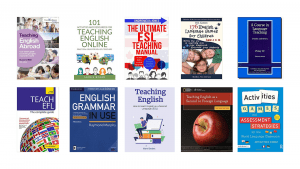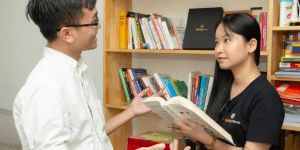Phil Wade Interviews: Simon Greenall
Simon Greenall has been an ELT textbook writer since 1982, is a past president of IATEFL and is currently an IH Trustee. He was on the Board of Management of the English Language Teaching Journal for thirteen years. As a textbook writer, He has published many books including exam material, adult and secondary courses, as well as radio and television programmes for the BBC. Since 2000 he has been co-editor in chief of textbook series for Chinese junior high and senior high schools, and universities. He has also worked as a consultant to the ministry of education in Palestine on the teaching of English in state schools. In recent years he has specialised in cross-cultural training, and his latest series Culturally Speaking was published in 2015 by Foreign Languages Teaching and Research Press, Beijing. He has given workshops, plenary and conference presentations in nearly fifty countries. In the 2013 New Year’s Honours List he was awarded an OBE (Officer of the Order of the British Empire) by Her Majesty Queen Elizabeth II.
You have held several high positions in ELT such as president of IATEFL and IH trustee, based on all this experience, what do you think is the future for ELT?
IATEFL grows exponentially every year, and I’m so proud of having been president, because everything that’s happened since my term of office (1997 – 1999) has been the realization of everything my predecessors and I had hoped to achieve. What an amazing association!
International House: I’m a trustee of International House Trust and a board member of International House London. I’m also a board member of International House World Organisation, which looks after the brand, shared with IH Trust and the affiliates around the world, over 150 at the moment.
How did I get into these positions? I don’t know! I was asked, encouraged, invited and I thought they’d be interesting. I remain a textbook writer but my boredom level is measured in nano seconds, and I love the work I do on these various boards and committees, including for thirteen years (!) on the board of management for the ELTJ. I think people invite me because I know the industry really well.
The future for ELT? Well, the place, the role of English is essential and pivotal in the world, even despite setbacks from Brexit. It has a deep cultural role which it continues to perform, and which I’ll talk more about below. But my friend David Graddol’s predictions about the imminent decline of English have yet to appear true. We are facilitators of an essential commodity, at least for the next few decades, and the rise of professionalism in our industry is a response to this. Pat on the back time, moment for self-congratulation: well done us!
What would you say is a good career path for a new teacher eager to advance both personally and professionally in this industry?
It’s no longer a backpacker profession and I’m so pleased that the development of CELTA, DELTA and other credible qualifications allow schools to employ reputable teaching staff. I also think that teachers with ambitions need to patch into social media and see or learn what’s going on elsewhere in the world.
My only concern is that some people, myself included, get overwhelmed by those who are travelling and enjoying their conference experience. Social media can be unkind about making people feel left out. But there’s so much integration, so much fun to be had online or in person joining in the global ELT village. Just don’t get overwhelmed. Sometimes what you’re doing at home is just as important as what others are talking about in public in somewhere attractive.
I read that you have given conference presentations in over 45 countries. What advice do you have for teachers eager to speak at conferences? Do you have any tips for choosing topics or proposals?
Oh, this one’s easy! Unless you’re talking about a major research project, people will love you for giving them a few classroom ideas, which they can use on the Monday morning after the conference.
Now, I ran out of good ideas, so I stopped presenting, but I did it for twenty-five years on the circuit, and it was time to step down. For those of my age who keep going, go figure.
Have a look at the Fair List site. It’s to encourage women to present at conferences, but the advice is good for men too. I support this group financially and I urge you to commit to its ideals.
You spent over 10 years working on a huge writing project in China making textbooks for every level of English education. How challenging was it to plan and create such a large course?
For me, it was a bit like a kid in a sweetshop! It was such a privilege to be hands-on for such an important project. My Chinese publishers and I get on extremely well, and although the whole thing has been like three-dimensional chess, we produced something which has so far sold 500 million ‘items’, better than Dan Brown but not quite as good as JK Rowling ..sorry I don’t mean to boast but it’s a major achievement for me.
We’re finalizing the 2nd edition of the final series, Senior High, and as always there are difficulties but we have such a good personal and professional relationship, I think we can get over the glitches.
From what I understand, all your Chinese books have to be approved by the government. How strict are they and what kind of content do they refuse to include and why?
Interesting questions. We all have to abide by certain PARSNIP guidelines in whatever work we do for other markets.
In China, we submit our material to the Ministry for their approval, much as many ministry projects oblige us to do. On a local level, we have an editor whose role is referred to as quality control. My Chinese friends laugh when I tease them with ‘fine about control, don’t get involved with quality’, and we’re really cool about this aspect of our work. It’s what we have to do with any project and my greatest privilege is now to know them well enough to predict what is acceptable and what is not.
Our own political correctness has to be suspended in this kind of market specific work, and even my own, hard left, right-on personal views are irrelevant. I understand what we’re doing in China and I’m aware that we’re collaborating on gradual change in the very politicized area of education. I can see what the Chinese government is trying to do, and I think we have the experience to help. I’m actually rather proud be part of this politico-social evolution in this extraordinary country.
You have been a consultant to several ministries of education. How important do you think governments see education? Also, should education be free?
Yes, MoEs are interesting people to work with … that’s not a euphemism for ‘difficult’, simply that they’re required to set standards which represent two parties: the state and the individual.
The state has a desire to ensure that education in English allows it to belong to the international community for reasons of trade, international relations, global diplomacy and the whole worldwide digital community. People who speak the same language tend not to start wars against each other.
On an individual level, being able to speak English gives everyone an advantage in seeking their best choice of jobs. Even in developed countries, such as Switzerland, a C1 level in English gives someone an opportunity to seek work with +50% salary.
That means the tax base in those countries is richer, tax payers earn more, they pay more taxes and everyone wins. OK, this might be simplistic, and I need to confirm the figures in 2016 which came from the British Council in 2013, but that’s where I’m coming from on the issue of education in English from the state and the individual’s point of view.
Should education be free? Don’t know. At a state level, no question, yes. At a tertiary and CPD level, I don’t have a view. Now, this reply makes me wonder why you asked the question and why I can’t answer it. Good question, CPD for me!
You were an English learning consultant to the Palestinian government. What role does and could English play in the political situation there?
No question. Two intractable and opposing states need and indeed, use English as a means of communication. The Palestinian Ministry Curriculum of English defines not only its requirements in ELT can-do terms, but also emphasizes the importance of English to help Palestine become a state in its own right. I get this.
A few of us tried to set up a scholarship scheme, to bring teachers from Israel and Palestine, to attend IATEFL conference, a cross border initiative. It didn’t work, we didn’t and couldn’t understand the complexities of the situation. I‘d really like to pick this up now that I have more time.
Learning English is not a just an issue of lexis and grammar, or skills or anything which is simply classroom bound, even though that, like the family and the household, is where things start. It’s an essential component for helping individuals towards personal empowerment, and states towards economic development.
As English language teachers, at least for the next few years, we can do far more than politicians, diplomats or soldiers to enhance everyone’s lives on this planet.
You published radio and TV programmes for the BBC. As the BBC is often the first and even main contact overseas students have with English, how representative would you say it is of real English language and culture?
Ah! The BBC, our national treasure. I have only good things to say about my time with them. They were ahead of their time because their costs were lower than those of publishers, and they produced some amazing, ground breaking material.
How representative is it of real English language and culture? I don’t know. I think the people who run the reduced service of what was English by Radio and Television are adapting to the modern requirements on them and supremely well to the ethos of ELT in the 21st century.
My one concern is that fifteen, maybe twenty years ago, we talked about developing materials, one minute slots, for delivery onto basic cellphones, not smart phones. In the developing world, many people still have access to basic cells. I wish I knew more about this from the BBC’s point of view, as it could be life- and career-enhancing for so many people in the developing world. This is what I care about now.
Given that you have worked across the world and that languages like Chinese and Arabic are now very popular, what do you see as the role of English?
Indispensable. As I said earlier, it’s a commodity which is needed by everyone who has ambitions to improve their professional profile, or any government which needs to belong to the international community.
This is not to downplay the importance of Chinese and Arabic. These languages are rising stars in the firmament of communication. For the moment, I still believe that English has cultural clout, soft power, something that we all buy into. It’s part of our everyday life, like coffee or gasoline, or movies or whatever. Actually, it occurs to me that I’d prefer to use the lower case english to denote its suitable relevance as a commodity. It won’t change in my lifetime, but maybe it will change in yours.
You received an OBE as recognition for your services to ELT in 2012 yet you continue to work. What other goals do you have?
Ha! The OBE was a surprise and there are so many other people who could have been honored along with Penny Ur and me in the 2013 New Year’s Honours List. I feel embarrassed about it. But then again, my mother would have loved it, and I have to say I was extremely proud and pleased. Who’d a thunk it?
But the OBE has nothing to do with future work, only work in the past and in progress. The goals I have are to be active in global ELT education because I can see from my own experience how this can transform people’s lives.
I’m no longer a trainer because I don’t have enough which is new to say, something I regret. OK, confession time: I’ve also lost my nerve about performing in public for the very same reason. I don’t like playing the same tune I used to on the circuit for twenty-five years.
But I invest my time and money in projects to develop teachers, to help them appreciate their own worth which will allow them to instill good principles of citizenship in their students. This is my remaining and enduring commitment to the profession.







